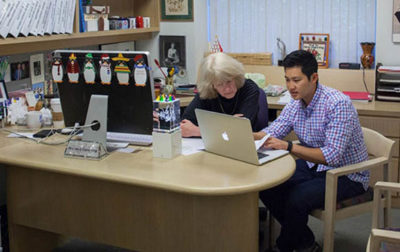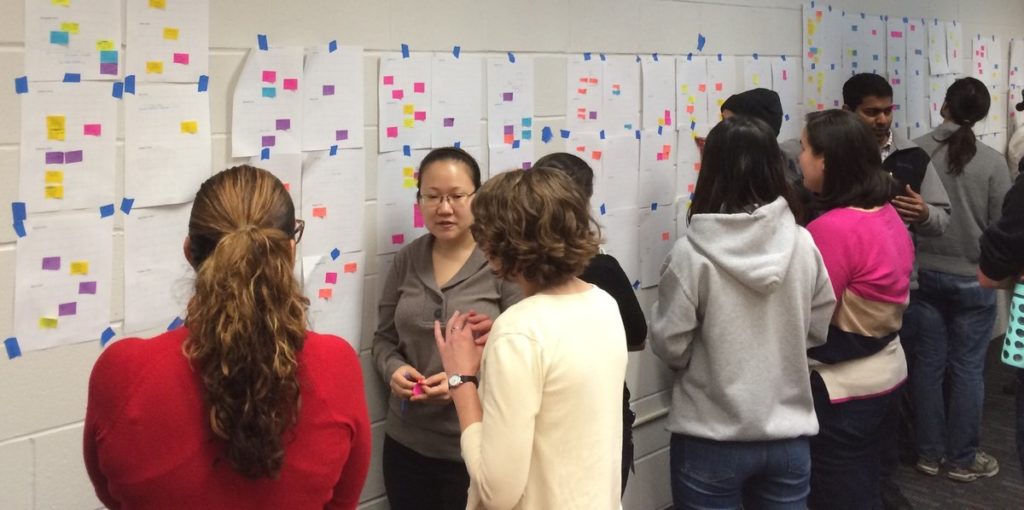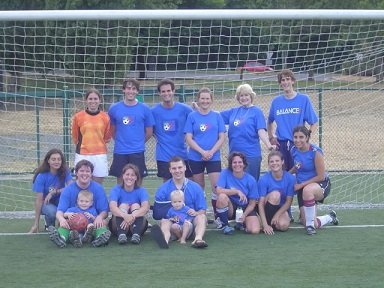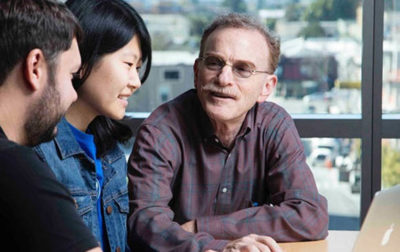When Mary-Claire King was a young PhD student, she remembers doubting, like many young PhD students do, whether she could make it as a scientist. King went on to make major contributions in research — winning the 2014 Lasker~Koshland Special Achievement Award in Medical Science, in part for discovering the BRCA1 gene locus involved in breast cancer. But early on, she was not confident in her ability to spot the important questions and figure out how to answer them if she ever became an independent researcher with her own lab. She credits her graduate school advisor for helping her transform “night and day” into a person who believed in her ideas and her data.

Mary-Claire King and her MD/PhD student, Aaron Seo. King tries to emulate the mentoring approach of her graduate advisor, Allan Wilson, who she says was patient, inclusive and rigorous about evidence.
King speaks of that advisor, Allan Wilson at the University of California, Berkeley, with the kind of gratitude and awe that one often reserves for parents or celebrities. She learned how to do science from the example he set: fearlessly tackling big questions about molecular evolution (a field he helped create), rigorously analyzing data, and then steadfastly standing by the data that passed muster. To King, now professor of medical genetics at the University of Washington, Wilson was more than an advisor who trained her and oversaw her research project — he inspired her to lead her own lab. King notes how “amazing” it was that Wilson had so many female and African American students in his 1960s-era lab. He created a lab culture that valued loyalty between lab members and inclusivity.
There is no shortage of evidence showing the impact that a good mentor can have on the success of early-career scientists. Being a good mentor depends on meeting the mentee’s needs in a tailored and personalized manner. A recent report by the National Academies of Sciences, Engineering, and Medicine outlined some of the impact of good mentorship: graduate students in STEM (science, technology, engineering, and math) fields who have positive mentor experiences are more likely to finish their degrees and publish their research; quality mentoring has also been shown to increase the likelihood that minority undergraduates pursue STEM careers and that African-American graduate students complete their PhDs.
Although many graduate school advisors may not have lived up to their full potential in the past, often treating students as apprentices rather than intellectual partners that they are supporting and nurturing, times appear to be changing. “The old idea was graduate students learn by doing, through osmosis…but it wasn’t what we would call mentoring now, because mentoring now [at least in the United States] means preparing you for life,” says Bruce Alberts, professor emeritus of biochemistry and biophysics at University of California, San Francisco, and recipient of the 2016 Lasker~Koshland Special Achievement Award in Medical Science.

Third-year PhD students at UMass Medical School discuss their Individual Development Plans, which include specific career questions they plan to ask their mentors.
“Preparing you for life” can mean many different things, such as teaching students how to communicate their research, get funding, network with other scientists, and navigate life-outside-the-lab challenges such as caring for young children. But Alberts points out, because only a minority of graduate students these days will become academic professors themselves, a big part of a mentor’s job is to help mentees explore other career options. And because professors tend to know more about being professors than other careers, this requires them to “know who knows about it and give [graduate students and post-docs] permission to take time away from lab to investigate these things,” says Alberts. He emphasizes that his time as president of the National Academy of Science (NAS) from 1993 to 2005 gave him appreciation for the key role mentors play in ensuring students feel their PhD experiences were worthwhile.
Although the prospect of advising students on career paths outside of academic settings can seem daunting, mentors, at least in the biomedical sciences, can likely look forward to getting more help with this thanks to the growing number of career and professional development offices at medical schools and biomedical graduate programs, says Cynthia Fuhrmann. Fuhrmann founded and directs the Center for Biomedical Career Development at the University of Massachusetts Medical School in Worcester and is associate professor of biochemistry and molecular pharmacology at UMass Medical. She points out that “there’s increasing interest in turning career development a little bit on its head and reframing it as part of the core PhD training experience,” as she is doing at UMass Medical.

Mary-Claire King and her lab played on a soccer team, which they dubbed “All the King’s Wo/men,” taking on other University of Washington teams.
King agrees that it is important for mentors to point mentees toward additional people and resources for help because, as she puts it, “we all have different mentors for different purposes.” For example, King often finds herself connecting female graduate students and post-docs in her group who have children to other mothers for support. She also offers help when she can and sympathy for an issue she says disproportionately affects women scientists.
One of the things that sets the best mentors apart is the long-term support and lasting impact they have on their mentees. Indeed, many of today’s leading scientists credit their mentors for making them who they are. Joan Steitz, winner of the 2018 Lasker~Koshland Special Achievement Award in Medical Science and herself a celebrated mentor, says she carried the hands-off mentoring style of her graduate advisor, James Watson, into her own lab at Yale University. As Steitz explains, “everyone has their own project and is on their own to seek help to make it work.” However, she does offer more guidance and support than her advisor did. For example, she holds regular meetings with subsets of lab members who have related projects, which she says adds to the sense of camaraderie she strives to create in her lab. “Almost everybody who has been in my lab who now runs their own lab does [subgroup meetings],” she says.
Steitz says it is critical to be particularly supportive when mentees are in the research doldrums. “I’m always finding myself saying to a student or a post-doc, ‘Just because it seems like it’s not working now, you just keep at it; you’ll see that eventually things will start working,’ and that’s always true. But it’s harder for someone at the start,” she says. Steitz has noticed that it seems even harder for women at the early-career scientist stage than men. She attributes this difference to women feeling stress from being in the minority, a phenomenon called stereotype threat. Steitz tells women, as she tells all her mentees, to try to compare themselves to their peers and not to senior scientists.

Randy Schekman meets with graduate students in his lab at University of California, Berkeley.
In some cases, mentors model for their protégés how not to be when they become mentors. Randy Schekman, professor of cell and developmental biology at University of California, Berkeley, describes his former graduate advisor, Arthur Kornberg of Stanford University, as “single-minded” and “brutally frank,” expecting people to be in the lab around the clock with their lab notebooks open for him to make notes in; he says that his at-times abusive style would be hard to get away with today. Nevertheless, Schekman, a 2002 Albert Lasker Basic Medical Research Award winner, says he succeeded because Kornberg’s scientific approach — distilling questions down to their biochemical essence — resonated with him, and he did not mind standing up to his advisor.
When Schekman started his own lab, he recalls thinking, “All I had to do was be tough as nails like Kornberg and I’d succeed. I tried but found it just wasn’t consistent with my personality.” Although Schekman admits that he probably also mellowed as he grew into an established independent investigator, he thinks it just suits him better to be a mentor who encourages open discussion of ideas and approaches.
Raymond Deshaies, who joined Schekman’s lab as a graduate student about eight years after Schekman started at Berkeley, appreciates that it was okay to challenge him. “You could say anything and be very free because you didn’t have to worry about Randy squashing you down,” says Deshaies, who is currently senior vice president of global research at Amgen, a California-based biopharmaceutical company.
For Deshaies, developing as a mentor himself meant adjusting to the different demands of the biopharmaceutical industry. He is not responsible for training his mentees as he would be in an academic setting, because they are already skilled scientists. Instead, he helps guide them through the steps needed to pick up the skills and expertise to advance their career at the company. There is also less of a role offering psychological and social support, which graduate students often need because they are younger, perhaps living on their own for the first time, and figuring out what they want to do with their lives. As Deshaies says of advising graduate students, “there is a lot of mentoring about growth pains.”
Mentoring is critical not only for graduate students, post-docs, and those moving up the biopharmaceutical ladder — even the most seasoned scientists can benefit from having a mentor. As King explains, “When you are a lab head, you have to take care of people…and you need to look for support for you.”
By Carina Storrs
